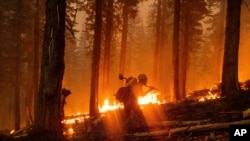Fire crews in Oregon and other western U.S. states continued to battle deadly wildfires Wednesday, which are producing smoke that has settled over East Coast cities thousands of miles away, such as New York and Washington.
The Pacific Northwest has been the hardest-hit region in the U.S., with Oregon becoming the latest and most concentrated hot spot.
Oregon Gov. Kate Brown said Monday night her state has been “pushed to its limits” by the historic wildfires that have destroyed hundreds of hectares of land and wiped out entire communities.
Brown told reporters she has asked President Donald Trump to issue a major disaster declaration for the Pacific Northwest state, which would make additional federal resources available to beleaguered firefighters and other emergency personnel. President Trump had already issued a federal emergency declaration for Oregon last week.
Oregon emergency management officials said some 16 people remained missing and that eight people have been confirmed dead. The officials said earlier that 10 people had been killed, but they lowered the death toll after two sets of remains were identified as animals.
Weather forecasters predict thunderstorms for Oregon Thursday and Friday, which could help firefighters contain the fires and clear the air of smoke that has blanketed the state since the fires began.
Air quality across Oregon has been characterized by state environmental officials as “hazardous” or “very unhealthy.” Visibility has been less than a half-kilometer in some places, according to the National Weather Service, making it dangerous to drive.
The infernos, brought on by several weeks of record heat and dry wind, have destroyed about 1.8 million hectares of land across Oregon, Washington state and California. A combined 35 people have been confirmed dead in the wildfires in the three states.
In California, the wildfires have killed at least 25 people, torched more than 4,200 homes and other buildings, and burned nearly 1.2 million hectares, more than in any single year in its history.
Crews in the southern California city of Los Angeles continued to fight a wildfire Tuesday that came within 150 meters of the renowned Mount Wilson Observatory, the U.S. Forest Service said.
California Sen. Kamala Harris witnessed the wildfire damage in her home state on Tuesday and declared “ideology should not kick in” when responding to the wildfire and climate crises. Her comments were apparently a veiled criticism of President Donald Trump, who visited the state on Monday, although she did not mention his name.
During his visit, when he spoke with state officials about the fires, Trump again brushed aside concerns about climate change as a catalyst for the increasing number and intensity of such fires and reiterated his call for western states to practice better forest management.
“When trees fall down after a short period of time, they become very dry — really like a matchstick,” Trump said when he arrived. “And they can explode. Also leaves. When you have dried leaves on the ground, it’s just fuel for the fires.”
But during the briefing, Democratic Gov. Gavin Newsom, a vocal critic of the president, noted that 56% of the land in California is federally owned, so the federal government has a major responsibility to improve forest management along with the state.
Newsom also challenged Trump on his open skepticism about climate change.
“We feel very strongly the hots are getting hotter, the dries are getting dryer,” the governor said. “Something has happened to the plumbing of the world, and we come from a perspective, humbly, that we assert the science that climate change is real. Please respect the difference of opinion out here with respect to the fundamental issue of climate change.”
Trump appeared to side with Newsom, but then predicted the climate “will start getting cooler.”
When pressed again on climate change by California Secretary for Natural Resources Wade Crowfoot, Trump said “I don’t think science knows actually.”
Before the president’s meeting, former vice president Joe Biden, the Democratic presidential candidate, denounced Trump as “a climate arsonist” during a speech from his home state of Delaware.
The former vice president said Trump’s approach is to ignore the facts and “deny reality,” calling that a full surrender to the effects of climate change.
A day after the president dismissed climate change as a cause of the wildfires, Scientific American, endorsed Biden, the first endorsement in its 175-year history. Editor-in-chief Laura Helmuth said the endorsement came after the magazine realized Trump’s administration was much worse for the scientific community than it initially believed.
Helmuth said the endorsement’s timing was coincidental because the decision was made over the past two months.
The publication’s editorial by senior editor Josh Fischman was highly critical of Trump for seeking cuts in scientific funding and for his management of the coronavirus crisis.
VOA White House Bureau chief Steve Herman contributed to this report.








